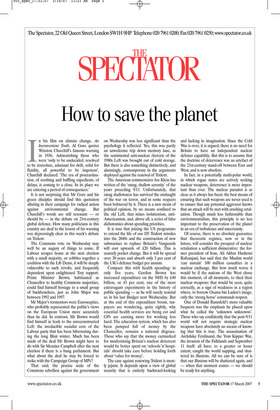How to save the planet
In his film on climate change, An Inconvenient Truth, Al Gore quotes Winston Churchill’s famous warning in 1936. Admonishing those who were ‘only to be undecided, resolved to be irresolute, adamant for drift, solid for fluidity, all powerful to be impotent’, Churchill declared: ‘The era of procrastination, of soothing and baffling expedients, of delays, is coming to a close. In its place we are entering a period of consequences.’ It is not surprising that Mr Gore and his green disciples should find this quotation alluring in their campaign for radical action against environmental change. But Churchill’s words are still resonant — or should be — in the debate on 21st-century global defence. How many politicians in this country are deaf to the lesson of his warning was depressingly clear in this week’s debate on Trident.
The Commons vote on Wednesday may well be an augury of things to come. If Labour scrapes home at the next election with a small majority, or cobbles together a coalition with the Lib Dems, it will be deeply vulnerable to such revolts, and frequently dependent upon enlightened Tory support. Prime Minister Brown, habituated as Chancellor to healthy Commons majorities, could find himself hostage to a small group of backbenchers, just as John Major was between 1992 and 1997.
Mr Major’s tormentors were Eurosceptics, who probably represented the public’s views on the European Union more accurately than he did. In contrast, Mr Brown would find himself in hock to the unreconstructed Left: the irreducible socialist core of the Labour party that has been hibernating during the long Blair winter. Much has been made of the deal Mr Brown might have to do with Sir Menzies Campbell after the next election if there is a hung parliament. But what about the deal he may be forced to strike with the Campaign Group of MPs?
That said, the precise scale of the Commons rebellion against the government on Wednesday was less significant than the psychology it reflected. Yes, this was partly an unwelcome trip down memory lane, as the sentimental anti-nuclear rhetoric of the 1980s Left was brought out of cold storage. But there is also something distinctively, and alarmingly, contemporary in the arguments deployed against the renewal of Trident.
The American commentator Joe Klein has written of the ‘smug, shallow serenity’ of the years preceding 9/11. Unfortunately, that smug shallowness has survived the onslaught of the war on terror, and in some respects been bolstered by it. There is a new strain of political opinion, by no means confined to the old Left, that mixes isolationism, antiAmericanism, and, above all, a series of false dichotomies about spending priorities.
It is true that joining the US programme to extend the life of our D5 Trident missiles into the 2040s and the construction of new submarines to replace Britain’s Vanguards will cost upwards of £20 billion. This is scarcely pocket change. But it will be spread over 30 years and absorb only 3 per cent of the UK’s defence budget per annum.
Compare this with health spending: in only five years, Gordon Brown has increased expenditure on the NHS by £40 billion, or 43 per cent, one of the most extravagant experiments in the history of public spending — as he will surely remind us in his last Budget next Wednesday. But at the end of this expenditure boom, taxpayers are wondering, quite rightly, why essential health services are being cut and GPs are earning more for working less hard. The education system, which has also been pumped full of money by the Chancellor, remains a national disgrace. Those who say that the money earmarked for modernising Britain’s nuclear deterrent would be better spent on ‘schools’n’ hospitals’ should take care before holding forth about ‘value for money’.
The case against renewing Trident is mostly jejune. It depends upon a view of global security that is entirely backward-looking and lacking in imagination. Since the Cold War is over, it is argued, there is no need for Britain to have an independent nuclear defence capability. But this is to assume that the doctrine of deterrence was an artefact of the 21st-century stand-off between East and West, and is now obsolete.
In fact, in a potentially multi-polar world, in which rogue states are actively seeking nuclear weapons, deterrence is more important than ever. The nuclear paradox is as clear as it always has been: the best means of ensuring that such weapons are never used is to ensure that any potential aggressor knows that an attack will be met with crushing retaliation. Though much less fashionable than environmentalism, this principle is no less important to the preservation of the planet in an era of turbulence and uncertainty.
Of course, there is no absolute guarantee that theocratic regimes, now or in the future, will consider the prospect of nuclear retaliation a sufficient disincentive: the former president of Iran, Ali Akbar Hashemi Rafsanjani, has said that the Muslim world ‘can sustain’ 100 million casualties in a nuclear exchange. But how much worse it would be if the nations of the West chose this moment, of all moments, to shed their nuclear weapons: that would be seen, quite correctly, as a sign of weakness in a region where, to borrow Osama bin Laden’s image, only the ‘strong horse’ commands respect.
One of Donald Rumsfeld’s more valuable bequests was the emphasis he placed upon what he called the ‘unknown unknowns’. Those who say confidently that the post-9/11 world will not require strategic nuclear weapons have absolutely no means of knowing that this is true. The assassination of Archduke Ferdinand, the Yom Kippur War, the invasion of the Falklands and September 11 itself: all have, to a greater or lesser extent, caught the world napping, and shattered its illusions. All we can be sure of is that our illusions will be shattered again, and — when that moment comes — we should be ready for anything.


































































































 Previous page
Previous page